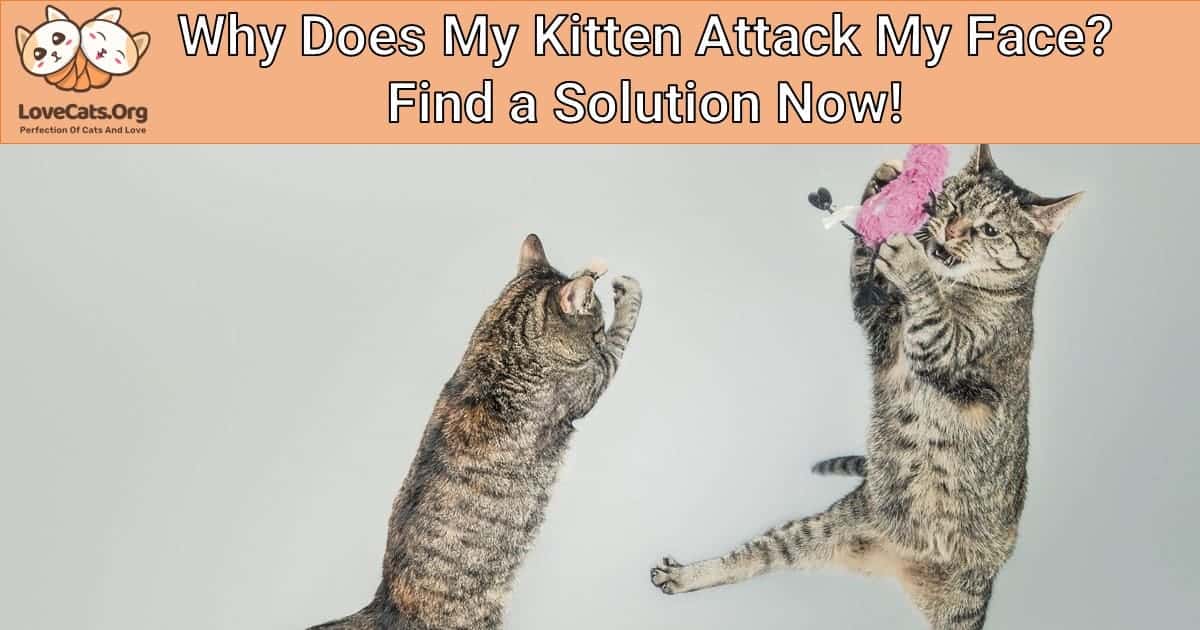My kitten attacking my face can be a very confusing and frustrating experience.
It’s important to understand why this behavior is happening to address it properly.
There are several possible reasons for your kitten’s aggression, such as:
- playfulness;
- fear or anxiety;
- lack of socialization with humans during the early stages of life; feeling threatened by something else in its environment (e.g., another pet);
- Medical issues like pain or discomfort from an injury/illness that causes them to lash out when touched on certain areas of their body, etc.
- I think kittens attack faces because they see our facial features as toys – eyes blinking and nose twitching make great targets!
- They may also think we’re playing along since cats often use their paws for hunting prey. So if you move too quickly away from them after being attacked, they might return for more fun!
How To Stop A Kitten From Attacking Your Face
To stop a kitten from attacking your face, there are several things you can do.
First and foremost, never use physical punishment or scolding for disciplining the cat; this will only make them more aggressive in the future.
Instead:
- Make sure they have plenty of toys for playtime – cats love chasing after small objects like feathers on strings!
- Give them lots of attention when they’re not being naughty so that their behavior is rewarded with positive reinforcement instead.
- Provide an area where your kitty can climb up high (like shelves or furniture). This gives them something else to focus on besides attacking people’s faces!
- When playing with kittens, keep one hand free. So that if needed, you can quickly move away without getting scratched by claws or bitten by teeth.
- Be patient and consistent – it may take some time before these techniques start working. Still, eventually, your furry friend should learn what behaviors are acceptable and which aren’t allowed around humans’ faces!
Is It Normal For My Kitten To Attack My Face?
It is normal for kittens to attack your face.
Kittens are naturally curious and playful, so they may try to swat at or bite your nose, eyes, ears, and mouth as part of their playtime activities.
This behavior can be cute when the kitten is small, but it can become dangerous if not managed properly!
Here are some tips on how you should handle this situation:
- Redirect the kitten’s attention by providing them with toys that keep them occupied, such as a scratching post or catnip-filled toy mouse.
- Teach your kitten “no” in a firm voice whenever they attempt to pounce on you. Make sure there’s no reward (like petting) after saying “no”; otherwise, it won’t work!
- If necessary, use deterrent sprays like bitter apple spray, which cats don’t like the taste of. Remember, never ever hit/scream at/or punish any animal for bad behavior because this could lead to more aggressive behaviors from both sides later.
- While attacking faces might seem funny now – it isn’t something we want our furry friends doing long term since it could cause harm either way around!
Why Does My Kitten Attack My Face At Night?
Kittens are naturally curious and playful creatures.
They love to explore their environment, including your face!
Unfortunately, this can lead to unwanted behavior, like attacking your face at night.
Here’s why:
- Kitten Teething – Just like human babies go through teething stages when they’re young, kittens do too! During these times of growth and development, they commonly use their mouths to explore the world around them, which includes biting or scratching you with those sharp little teeth.
- Hunting Instincts – Cats have an innate hunting instinct that kicks in during playtime (especially if something is moving). This means that even though you may not be prey per se, cats will still try to “hunt” by pouncing on whatever catches their eye. That includes your nose or mouth area while sleeping!
- Attention-Seeking Behavior – If kitties aren’t getting enough attention from us, humans might resort to different tactics, such as attacking our faces at night to get noticed more often throughout the day/night cycle. It could also just mean that they want extra cuddles before bedtime, so make sure to give plenty of snuggles beforehand 🙂
Why Is My Kitten Trying To Bite My Face?
My kitten is trying to bite my face for a few reasons.
- It could be because they are teething and need something soft, like skin or fabric, to chew on. This helps them relieve the discomfort of their growing teeth.
- Kittens can play rough when interacting with humans as part of normal development. Biting your face may be an extension of that behavior!
- Cats often use body language such as licking and nibbling to show affection toward people they care about. So if you have been spending lots of time together recently, this explains why your kitty has taken a liking to nipping at your cheeks!
- Some cats enjoy playing games where they chase after objects (like fingers!) which means that even though it’s not ideal behavior from our perspective – it’s still fun for them!
To prevent further incidents:
- Provide plenty of toys/scratching posts around the house;
- Give regular attention but don’t overstimulate by petting too much;
- Reward good behaviors with treats & praise.
In conclusion: understanding why kittens do certain things will help us better manage these behaviors in the future.
Conclusion: Why Does My Kitten Attack My Face?
My kitten attacking my face is a common behavior among cats.
It can be caused by many things, such as playfulness, boredom, or even fear.
To prevent this from happening in the future, it’s important to provide your cat with plenty of toys and activities to keep them entertained.
Also, ensure they have enough space for themselves, so they don’t feel threatened when you approach them.
Additionally, try not to startle your pet while playing together. Sudden movements may cause an attack out of surprise!
In conclusion, understanding why kittens act aggressively toward us is key to preventing these attacks from occurring again.
Providing our pets with love, attention, and stimulating environments are essential steps we must take as responsible owners.


